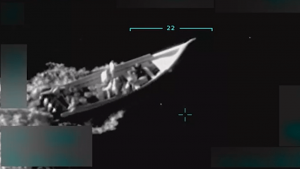The Electric Vehicle, EV, revolution is catching on.
EVs, apart from being environmentally friendly, have much lower acoustic noise while in operation.
Also, they are more reliable and cheaper to operate because they have less parts to break down or maintain.
EVs do not have some moving parts like timing belt and other accessories like spark plugs, injector nozzles, fuel and oil filters as internal combustion cars.
A study by US Department of Energy found that maintenance costs for an EV is 6.1 cents per mile as against 10.1 cents per mile for an internal combustion engine.
Initial costs of purchasing one, depending on the brand, may be slightly higher now, but EVs offer better economics overall.
By 2020, there were 10 million EVs on the road worldwide.
The University of Lagos has test-run its Zero Emission Vehicle, ZEV.

The Electric Vehicle can carry six persons at an average speed of 110 kilometres/hour for 350 kilometres on a full Lithium Ion battery charge.
However, on Nickel Hybrid battery, it can only do 20 km/hr for five kilometres inside the campus.
The Energy Management System is programmable to maximum range per battery charging cycle at this campus shuttling speed of 20 km/hr but can be switched over to the highway mode of 110 km/hr by the driver.

The Vice Chancellor of the university, Professor Oluwatoyin Ogundipe, said this system is not available in other Electric Vehicles.

photo credit: premiumtimes
Work on it started in 2018 till June, 2021 when it was ready and was presented to the public.
The university says the sitting capacity can be re-configured and increased from six to 18.
The software for ZEV is 100% Nigerian, while the hardware is 37% foreign.
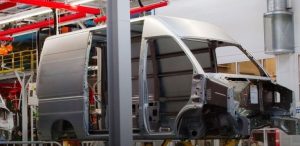
Jet Motors, a Nigerian car assembly plant, has also gone into Electric Vehicles.
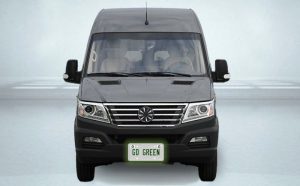
Its buses can re-charge fully in two hours and have a 260-kilometre range when fully charged.
US President Joe Biden on 5 August, 2021 signed an executive order making it mandatory for zero-emissions vehicles to account for at least half of all automobiles sold in the US by 2030.
As many as 23 international car brands say they are fully launching EVs in the next four years.
French car maker, Renault, has commissioned China’s Envision group to build a $2.4 billion battery plant in Douai, France, to produce higher-performance battery packs for its EVs.
The plan starts with the production of 9 gigawatt-hours of batteries and 24 gigawatt-hours later and will create 2,500 jobs.
Nissan and its Chinese partner on 1 July, 2021 pledged $1.4 billion to build a giant battery plant in UK that can power 100,000 vehicles a year and create 6,200 jobs.
Volkswagen, in March, 2021 unveiled a multi-billion dollar plan for six European battery factories.
Mercedes launched a dedicated battery-powered line, called e-tron, with its first EV in 2018.
In summer, 2021 the company’s EV, the e-tron GT, with 469 hp is making a debut for $99,000.
By 2025, Mercedes will offer EV alternative to all its fossil fuel cars.
Mercedes-Benz is spending $47 billion towards turning EV only before 2030.
Some of the other car makers are turning their existing models into EVs. They are: Hummer, Cadillac, Ferrari, Porsche, Jaguar and Audi.
Hyper cars are not left out. The Japanese are coming before the end of 2021 with the Aspark Owl with 1,985 hp, ability to go from zero to 60 mph in 1.72 seconds, a top speed of 249 kilometres/hour and a 280-mile driving range.
It will go for $3.56 million.
In 2025, Norway will become the first country to stop the sale of combustion engine cars.
To encourage this transition, she exempts EVs, from car taxes.
In May, 2021 EV sale was 60% of all car sales in the country.
It is estimated that 5% of all new cars sold in the world in 2021 are EVs. This will jump to 20% in 2025, 40% in 2030 and 100% by 2040.
Advances in Lithium-ion batteries mean that they no longer overheat, catch fire or explode and this is great news for EV manufacturers.
Car maker, Jaguar, plans to sell only EVs by 2025, Lotus; 2028, Volvo, Fiat, Lincoln; 2030, General Motors; 2035.
Lucid Motors, an American electric car manufacturer, announced it has sold out the first version of its Air Electric Sedan car.
All 500 cars in this version are to be ready early 2022.
Lucid Motors, formerly known as Atieva, completed its $700 million factory and started production in Spring, 2021.
The cars go for about $77,400, but another upcoming version – Dream Edition – will go for $160,000.
Lucid electric cars can run for 500 miles (800 km) on one full charge.
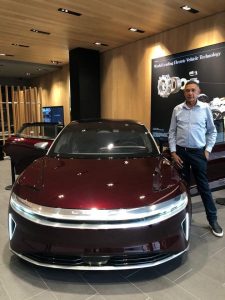
picture courtesy: Ben Murray-Bruce facebook
One of the buyers is Nigerian Senator Ben Murray-Bruce who said he has paid a deposit for the electric car and asked the government of Nigeria to ban all vehicles running on fossil fuel by 2035.
Lucid faces competition from other EV makers like Tesla, founded in 2003, which delivered 500,000 EVs in 2020.
Tesla’s Model S users gave it 99% confidence vote.
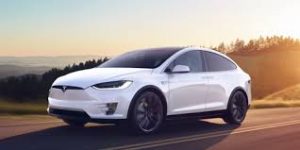
Its only problem is that its battery is said to run out of energy quickly and takes a longer time to recharge.
Economics is another factor in the competition: Chevrolet Bolt EV sells for $37,495; more competition comes from Volkswagen VWAGY, Hyundai Kona Electric and Kia Electric Motors.
NIO Motors in China which started in June, 2018, has sold 82,866 EVs. In January, 2021 alone, it sold 7,225 EVs.
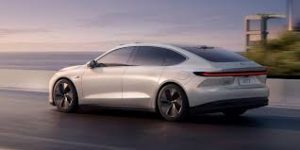
NIO’s challenge is that it does not presently, have a market outside China.
Ford has come up with its all-electric truck, the 563-horsepower F-150 Lightning which can go for 300 miles on one full charge.
It goes for $40,000.
Ford says it received 44,500 pre-orders for it in two days after it was unveiled.
Tesla , in 2019 received 250,000 pre-orders for its Cybertruck in just five days.
A Rosenbauer RT fire truck that does all that traditional fire trucks do and even more, has also been unveiled.
The US fire departments in Los Angeles, Portsmouth and that of Vancouver, Canada, have already bought the truck.
The Vatican’s Laudato si’ Action Platform directs all Catholic institutions to become environmentally sustainable within seven years.
Overall, the future promises to be electric.
However, the easy availability of charging points is essential for EV revolution to catch on.
The US is spending $15 billion for a network of 500,000 charging stations.
According to the US Department of Energy, there are about 41,400 of such stations now but less than 5,000 of them are fast chargers.
There are an estimated 150,000 gas stations in US.
A fast EV charging station costs $125,000 to $150,000 to install for now as against $20,000 for the construction of a double-sided petrol pump.
This is expected to go down as the EV revolution catches on.
EVs come with far-reaching economic consequences.
The world sugar market is already concerned about the effect of a sugar glut as Brazil goes electric and phases out ethanol production from crushed sugar cane for automobile fuel.
If other countries follow, world sugar price may crash before 2030.
There is also environmental concern on increased mining of lithium, nickel and cobalt for making batteries for EVs.
To minimize that and the possibility of millions of EV batteries being an environmental nuisance after use, tests are being conducted on turning them into solar battery packs or recycling them.
If all goes well , the problem will be solved before it emerges so as not to slow the electric revolution.
On 21 May, 2021 the world’s seven largest economies in a London meeting, agreed to stop international financing for coal projects that emit carbon dioxide by the end of the year and phase out support for all fossil fuels by 2030 to meet climate change targets.
The G7 nations – US, UK, Canada, France, Germany, Italy and Japan, plus the European Union, re-pledged their commitment to limiting global rise in temperature to 1.5 degrees Celsius of its pre-industrial level.
In another G7 meeting in June, 2021 in Cornwall, UK, the U.S., Canada, Germany and the U.K. agreed to provide $2 billion in financing to help developing countries in their transition away from coal.
They also proposed phasing out petrol and diesel engine vehicles by the end of the decade.
picture courtesy: senator ben murray-bruce facebook, lucid, tesla, nio, ford, premium times, jet

